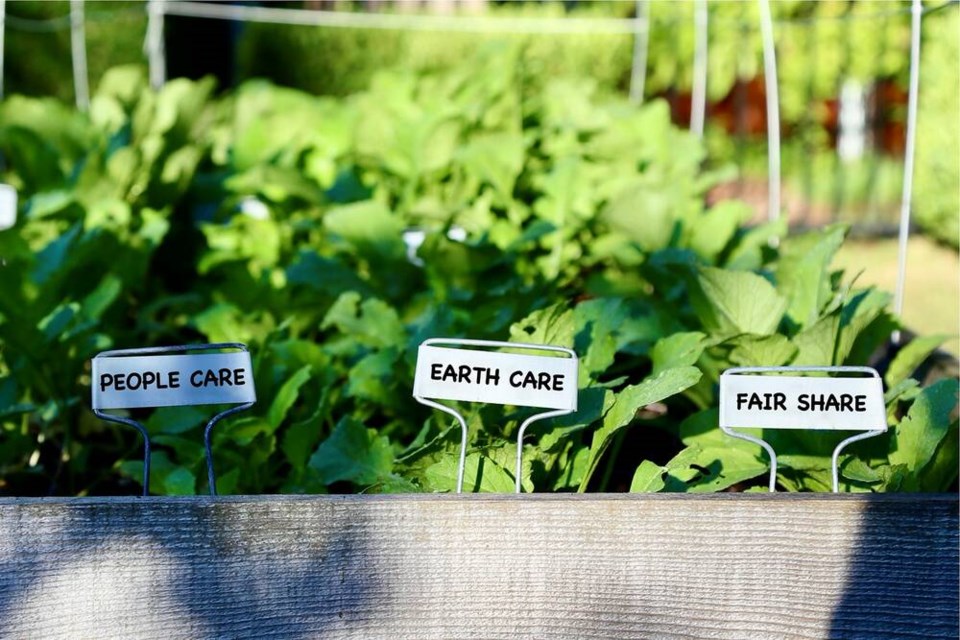As we close in on an early growing season, my social media feeds are filling up with conflicting, oftentimes alarming posts claiming absolute truths about the right and wrong ways to grow and harvest food on a small or large scale to save humanity and the planet.
This unchecked discourse feels increasingly polarizing, as if one cannot be for something without being against another, as if there is no place for compromise. As accredited media outlets dwindle in numbers, cited facts and considered debate become harder to find. It is difficult to know what or whom to believe.
For those who might share this frustration, permaculture (a.k.a. permanent agriculture) principles for living and land use provide a framework within which to consider opinions, make decisions, develop a fact-based language for constructive dialogue and, importantly, nurture hopefulness – a 30,000-foot level operating system for people and planet.
Before returning to university to study permaculture and regenerative systems, I worked for three decades in corporate communications. I studied journalism, and entered the workforce at a time when federal, provincial, community and industry oversight demanded fact-checking and third-party collaboration on every level. Offenders were subject to fines, even prosecution. Unsubstantiated claims rarely saw the light of day.
As a nature lover, I have always known instinctively that all organic life forms, including people, are deeply connected and have evolved symbiotically. Nature created a near-perfect interdependent system where all plants, animals and elements thrive in nature – without chemical or mechanical intervention by humans – and co-exist in a mutually beneficial order.
For me, diving deep into permaculture’s three overarching ethos of “earth care, people care, fair share” and 12 foundational principles created a foundation to understand natural systems, and the relationship between soil health and our survival as a species. And furthermore, to build a framework for living and decision-making that fosters understanding and eliminates noise.
Natural systems are mind-blowingly complex and elegant, and altering them has serious consequences to human and planetary health. Indigenous people have understood this principal since time immemorial. But until quite recently, scientific evidence was relatively scarce.
Fortunately, thanks to an impressive body of peer-reviewed clinical research and well-executed field trials, basic truths about the evolution of agriculture, pharmaceuticals, land use and resource management are gaining widespread acceptance.
These truths fit naturally within the architecture of permaculture living and land use, and can be adapted at scale across all sectors of the economy: from agriculture and healthcare, to transportation and technology.
Compromise is essential to move toward positive, incremental change, and away from combative zero-sum thinking. By making small, well-considered shifts consistently over time, we can create a groundswell of positive change across all sectors.
One need only recall the tremendous self-regulating, self-healing power of natural systems, evidenced during the industrial shutdown that took place during the early days of the COVID-19 pandemic, to believe in possibility.
By fine-tuning my social media follow criteria, and increasing my exposure to accredited news sources and podcasts, I have been rewarded with a stream of positive and actionable news about people, policies and institutions – knowingly and unknowingly incorporating permaculture principles at all levels of society.
In the words of permaculture founders Bill Mollison and David Holmgren: “Permaculture draws together the diverse ideas, skills and ways of living that need to be rediscovered and developed to provide for our needs, whilst increasing the natural capital for future generations.”
To this I would add: “Do no harm.” Let’s stay positive.
Laura Marie Neubert is a West Vancouver-based urban permaculture designer. Follow her on Instagram @upfrontandbeautiful, learn more about permaculture by visiting her Upfront & Beautiful website or email your questions to her here.
For a taste of permaculture, watch the video below:




